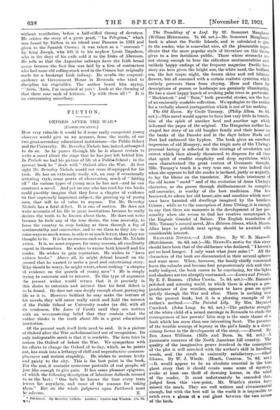FICTION.
OXFORD AFTER THE WAR.* [cosisiumearea]
How very valuable it would be if some really competent young observer would give us an account, from the inside, of our two great secondary educational institutions—the Public School and the University. Mr. Beverley Nichols has, indeed, attempted to do so. As he passes through life he is almost certain to write a novel about the stage that he has just left behind him. In Prelude:we had his picture of life at a Public School ; in the present book he " deals with " Oxford after the War. At first sight Mr. Beverley Nichols would not seem ill-equipped for his task. He has an extremely ready, wit, an easy if occasionally irritating style, some power of observation, much of " hitting off " the various types of young men he has met—and he can construct a novel. And yet no one who has read his two books could possibly imagine that they form a chapter of evidence on that supremely important subject, the growing up 'of young men, that will be of value to anyone. For Mr. Beverley Nichols has a fatal defect. It is one of motive. He does not write accounts of his life in great institutions because he really desires the truth to be known about them. He does not write because he feels any of the true desire, the true necessity, to force the country to stop looking at them through a fog of sentimentality and convention, and to see -them us they are—in some ways so much worse, in others so much better, than they are thought to be. It is for no reasons such as these-that Mr. Nichols writes. It is, we must suppose, for many reasons, all excellently cogent in themselves. He wishes to amuse both himself and his reader. Ho wishes to gain reputation. He wishes to " have written books." Above all, he might defend himself on the ground that ho wanted to make a good and entertaining story. Why should he worry, he might retort, about making " a chapter of evidence on the growth of young men" ? He is simply trying to entertain and to interest. To this type of argument the present writer would return that it is precisely in this desire to entertain and interest that his fatal defect is to be found. He does not care deeply enough about.portraying life as it is. However brilliant he may make the texture of his novels, they will never really catch and hold the interest of the Public School or University reader (as did, with all its crudeness, The Loom of Youth) until they : are written with an overmastering belief that they contain what the author thinks is the truth about life in a great educational institution..
tution.
Of the present work itself little need be said. It is a picture of Oxford after the War melodramatized out of recognition. Its only indisputable merit is that it is readable. The hero tries to restore the Oxford, of before the War. We sympathize with his efforts to change the Oxford of to-day, which, as- ho points out, has sunk into a lethargy of chill and unproductive common- placeness and serious stupidity. He wishes- to- restore levity and gaiety to the city. This is the best point in the book. For the rest, it contains numerous portraits of real people, all just like enough to give pain. It has some pleasant epigrams, of which the following description of laborious dullards seemed to us the best : " One feels he . knows the time every train leaves for anywhere, and none of the reasons for taking them." But' on the whole judgment upon Patchwork must • Patchwork. By Beverley Nichols, Loudon chatto and Whale.% 17s. ed. let.]






































 Previous page
Previous page